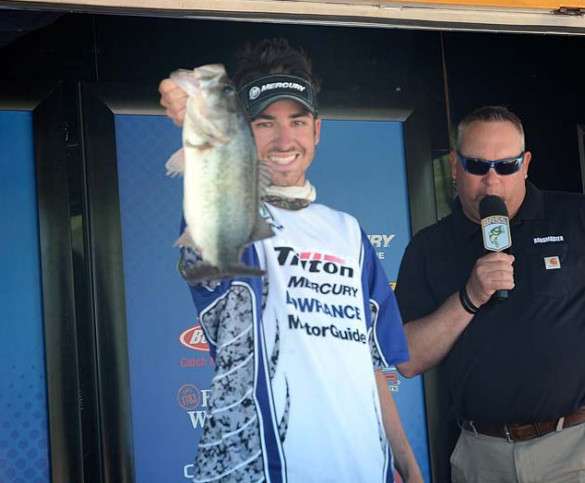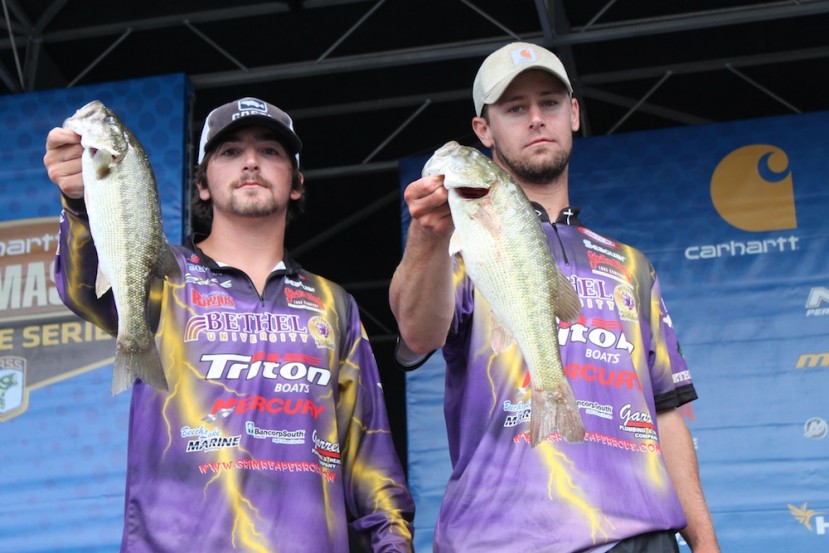
Lance Freeman has touched every rung available to him so far on his way up the bass fishing ladder. In 2011, he won the 15- to 18-year old division of the Bassmaster Junior World Championship. Last year, he competed in the Bassmaster College Series National Championship. Next week, as a result of his showing in April’s B.A.S.S Nation Southern Divisional on South Carolina’s Pee Dee River, he’ll compete in the 2015 Old Milwaukee B.A.S.S. Nation Championship.
While his first two championships were limited to his age-group peers, now he’ll be competing against anglers who have decades of additional experience.
“The B.A.S.S. Nation is designed for the working class individual,” said Freeman. “It makes it so guys with a normal job can advance to the next level.”
Unlike the contractors and pastors and salesmen who comprise the rest of the field, Freeman doesn’t have a “normal job.” He’s a civil engineering major at Murray State University, preparing for his future in case a gig in professional angling doesn’t work out.
He’ll be joined by another civil engineer, Matt Roberts, who qualified through the Southern Divisional at Ross Barnett by a slim margin. While Roberts may have a “normal job” — he’s a materials analyst in the supply chain for an automobile manufacturing company — he, too, stepped up to the Nation as a result of his successful stint at Bethel University, one of the flagship programs of collegiate fishing.
He’s one step removed from college, but like Freeman, he’s also just one step removed from the Bassmaster Classic.
While prior generations celebrated the leap of anglers like Gary Klein directly from high school graduation to the pros, with no intervening steps, the addition of the college ranks adds a softer landing spot for those who don’t necessarily have the experience or finances to make the immediate leap at 18.
Brandon Card was the first collegiate angler to make an appearance on the Elite Series, immediately after his successful fishing career at the University of Kentucky, and is set to make his second Bassmaster Classic appearance in 2016 at Grand Lake. Auburn students Matt Lee and Jordan Lee made the Classic through the college circuit before ascending to the Elites through the Opens, and Jordan finished ninth overall in the AOY race during his rookie season of 2015. Now Brett Preuett, a University of Louisiana-Monroe grad who competed in the 2015 Classic as a result of his collegiate efforts, is set to join the Elites in 2016. While the pipeline hasn’t yet gone from trickle to a fire hose, it’s rapidly gaining strength.
Collegiate fishing provides aspiring pros with an opportunity to build their game at next to no cost.
“When you’re just starting out, you need to fish for fun, not for a paycheck,” Freeman said. “Most of the schools help out. It’s a team environment, not real cutthroat, and that puts things in perspective. You develop sportsmanship, and there’s also an opportunity to grow.”
Freeman grew up a half mile from Lake Barkley, so he’d had experience on typical tournament venues, but for Roberts, who moved to west Tennessee from southeast Iowa, the learning curve was steeper.
 “When I got here, the transition was very easy,” he said. “There were 25 kids on the team and everybody was awesome. Zach Parker, in particular, became a lifelong friend. I grew up fishing knee deep on the Mississippi River. I had to transition to offshore fishing on the Tennessee River lakes, and Zach taught me a lot about it.”
“When I got here, the transition was very easy,” he said. “There were 25 kids on the team and everybody was awesome. Zach Parker, in particular, became a lifelong friend. I grew up fishing knee deep on the Mississippi River. I had to transition to offshore fishing on the Tennessee River lakes, and Zach taught me a lot about it.”
Since then, Roberts has gone on a crash course, fishing across the South with multiple stops in Alabama, Tennessee, Georgia and Kentucky.
Both Freeman and Roberts dismissed concerns that they’d missed out on the college experience by pursuing a sport that often required them to wake up when many of their peers were just getting to bed.
“Lots of people arrive at college gung ho to party,” Freeman said. “But you get so much more out of what we do as college anglers. I’d rather fish or bow hunt or duck hunt than party. That’s my kind of party and I’ve made the most of it.”
Indeed, the discipline required of collegiate fishing translated into their academics. Both pursued engineering majors, hardly an easy path, and now they hope to utilize their well-developed study skills to benefit them on the water. Roberts, for instance, said the totality of his collegiate experience gives him confidence to attack new waters. Prior to the qualifier at Ross Barnett, he hadn’t visited the lake, and “didn’t know anybody who’d ever been there,” but he applied knowledge he developed fishing in Florida to the similar environs. While he plans to visit Ouachita before it goes off limits, he noted that he already has a head start by studying the results of past tournaments and spending substantial time on Google Maps.
Neither qualifier said he has run into any overt age discrimination from a draw partner at the B.A.S.S. Nation level, but Roberts admitted that occasionally “when you get paired up with a co-angler and they see how young you are, they don’t expect much.” Freeman said that just “fuels the flame.”
At the Ouachita River, most of the anglers they’ll be competing against will be old enough to be their fathers. Some will be old enough to be their grandfathers. Fortunately, the fish don’t discriminate according to age.
“I want to make a strong showing for what college fishing represents,” Freeman concluded.

